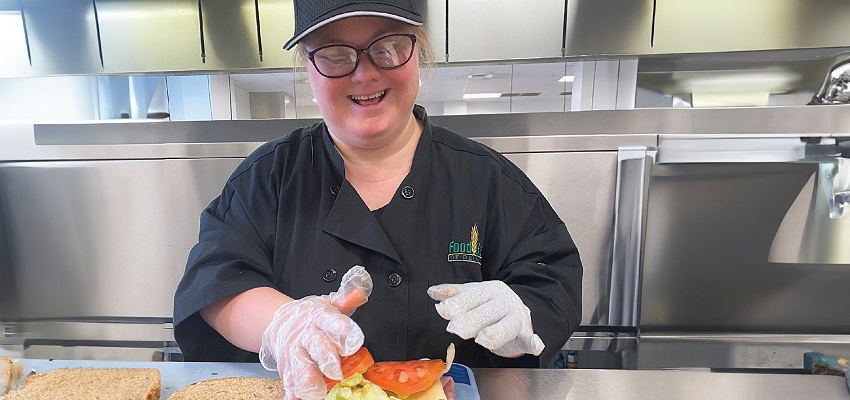Articles
July 16, 2024
Restaurants create opportunity for all
Restaurant Ready program equips people with disabilities for industry jobs, offers solutions for employers.

One of the students at the Food Bank of Delaware's Kitchen School puts some of her training skills to work.
The National Restaurant Association Educational Foundation (NRAEF) has partnered with state restaurant associations and community-based organizations in Colorado, Delaware, and Michigan, to pilot its Hospitality Pathways Project, which seeks to increase access to work-readiness training and employment for people with disabilities.
“Universal design originally started as an architectural concept—having doors wide enough or ramps available so people could have physical access to spaces, but then we started thinking about individuals’ access to program activities and materials, including a variety of formats, reading levels, and learning styles,” says Patricia D. Gill, the Foundation’s director of workforce development. “That’s when we began to look at how Restaurant Ready could fit those needs. The magic of universal design is that it increases access for all individuals with and without disabilities.”
“There are different ways people can show they understand,” she says. “Our goal is to allow people to attach different types of meaning to the information presented and connect it to their own life experience. For example, if someone is trying to understand a lesson on measurements, we can make it more hands-on by showing them the different measurements in a recipe in addition to just having it in a workbook. They can receive the information in another way than reading it.”
The program also offers practical access ideas, such as offering closed captioning on videos for hearing-impaired individuals as well as written materials in larger font sizes for visually-impaired participants.
Gill says the Foundation is consistently working to engage populations who are either underemployed or face barriers to employment, adding that people with disabilities have lower employment rates than the general population. The goal is to provide more opportunities to people whose options have always been limited.
Anna McDermott, FBD’s chief impact officer, says her organization partnered with the NRAEF and the Hospitality Pathways project about two years ago to augment its own 12-week Kitchen School training program.
“Our Kitchen School training program primarily serves people with intellectual and developmental disabilities who are sometimes challenged when asked to multitask and switch tasks, especially on short notice,” she says.
“We’re working with them to zero in on specific roles, allowing them to become comfortable in those roles rather than expecting them to switch between different roles or tasks at the same pace we do with our traditional program. We’re also providing them with additional support when transitioning to employment.”
Tinishia Sanders, the food bank’s specialized training program director, gave an example of how they’ve used one Restaurant Ready learning module to focus on personal responsibility and time management.
“One thing we teach is signing in and signing out,” she says. “We explain to our students that if they don’t sign in for work, that means they’re not there that day. “We teach our students that skill so when they're required to sign in or clock in and out, they know they'll get paid or credited for the hours they are there. And if we have students who aren’t that savvy with a computer or have some limitations in their ability to understand the concept of that system, we work with their employers to find a workaround solution.”
Sanders says the program’s employment rates have been as high as 82% and as low as 40% depending on the class and the students’ skillsets.
McDermott is encouraging employers to hire more employees with developmental disabilities, because it’s good for business and morale.
“They're going to show up for work every day and, if they’re in the right position, will probably stay long-term at that job,” she says. “That's something a lot of employers are really struggling to find in this labor market. It might take a little bit of a shift in how they approach their hiring, onboarding, and training, and even how they divide up work in their kitchens. But, if they do it, they're going to have someone who's really dedicated, who's going to show up on time, who's going to stay with that organization. Having someone with a disability working in your operation can really change the whole dynamic of the workplace.”
To increase the access of all participants, NRAEF will soon distribute practices and materials from the Hospitality Pathways Project to Restaurant Ready programs and its partners in 30 states.
Learn more about adapting inclusive practices and the Hospitality Pathways Project here.
Understanding universal design
The program, funded by a Kessler Foundation Signature Employment Grant, is based on the NRAEF’s Restaurant Ready program, which offers training in six work-ready competency areas defined by the hospitality industry. It’s designed to give participants the skills, discipline, and confidence to achieve job readiness. Using the concept of universal design, the project takes Restaurant Ready’s learning tools and best practices one step further, providing toolkits and suggestions for training that increase access to the competencies and training materials.“Universal design originally started as an architectural concept—having doors wide enough or ramps available so people could have physical access to spaces, but then we started thinking about individuals’ access to program activities and materials, including a variety of formats, reading levels, and learning styles,” says Patricia D. Gill, the Foundation’s director of workforce development. “That’s when we began to look at how Restaurant Ready could fit those needs. The magic of universal design is that it increases access for all individuals with and without disabilities.”
Different ways to take in information
According to Gill, the training can be taught verbally, on video, and in a hands-on capacity, instead of just on paper.“There are different ways people can show they understand,” she says. “Our goal is to allow people to attach different types of meaning to the information presented and connect it to their own life experience. For example, if someone is trying to understand a lesson on measurements, we can make it more hands-on by showing them the different measurements in a recipe in addition to just having it in a workbook. They can receive the information in another way than reading it.”
The program also offers practical access ideas, such as offering closed captioning on videos for hearing-impaired individuals as well as written materials in larger font sizes for visually-impaired participants.
Gill says the Foundation is consistently working to engage populations who are either underemployed or face barriers to employment, adding that people with disabilities have lower employment rates than the general population. The goal is to provide more opportunities to people whose options have always been limited.
Establishing a partnership
While the Hospitality Pathways Project sites include people with and without disabilities, one of them, the Food Bank of Delaware, focuses specifically on including people with intellectual and developmental disabilities.Anna McDermott, FBD’s chief impact officer, says her organization partnered with the NRAEF and the Hospitality Pathways project about two years ago to augment its own 12-week Kitchen School training program.
“Our Kitchen School training program primarily serves people with intellectual and developmental disabilities who are sometimes challenged when asked to multitask and switch tasks, especially on short notice,” she says.
“We’re working with them to zero in on specific roles, allowing them to become comfortable in those roles rather than expecting them to switch between different roles or tasks at the same pace we do with our traditional program. We’re also providing them with additional support when transitioning to employment.”
Tinishia Sanders, the food bank’s specialized training program director, gave an example of how they’ve used one Restaurant Ready learning module to focus on personal responsibility and time management.
“One thing we teach is signing in and signing out,” she says. “We explain to our students that if they don’t sign in for work, that means they’re not there that day. “We teach our students that skill so when they're required to sign in or clock in and out, they know they'll get paid or credited for the hours they are there. And if we have students who aren’t that savvy with a computer or have some limitations in their ability to understand the concept of that system, we work with their employers to find a workaround solution.”
Sanders says the program’s employment rates have been as high as 82% and as low as 40% depending on the class and the students’ skillsets.
McDermott is encouraging employers to hire more employees with developmental disabilities, because it’s good for business and morale.
“They're going to show up for work every day and, if they’re in the right position, will probably stay long-term at that job,” she says. “That's something a lot of employers are really struggling to find in this labor market. It might take a little bit of a shift in how they approach their hiring, onboarding, and training, and even how they divide up work in their kitchens. But, if they do it, they're going to have someone who's really dedicated, who's going to show up on time, who's going to stay with that organization. Having someone with a disability working in your operation can really change the whole dynamic of the workplace.”
To increase the access of all participants, NRAEF will soon distribute practices and materials from the Hospitality Pathways Project to Restaurant Ready programs and its partners in 30 states.
Learn more about adapting inclusive practices and the Hospitality Pathways Project here.
Supported by
-
Coca-Cola CompanyFor the past 20 years, the Coca-Cola Company has partnered with the National Restaurant Association Educational Foundation to develop new leaders and talent, while giving employees the ability to advance their skills and increase their income. Today, The Coca-Cola Company launched their Coca-Cola Leader Lab , a people-centric leadership program that addresses a significant issue facing the future of foodservice: attracting, developing and retaining an engaged frontline workforce.Learn more
Sign up for our Newsletter
The latest news from the National Restaurant Association, published every other Thursday
By clicking Submit I agree to receive email communications from the National Restaurant Association and agree to our Privacy Policy(Opens in a new window).
